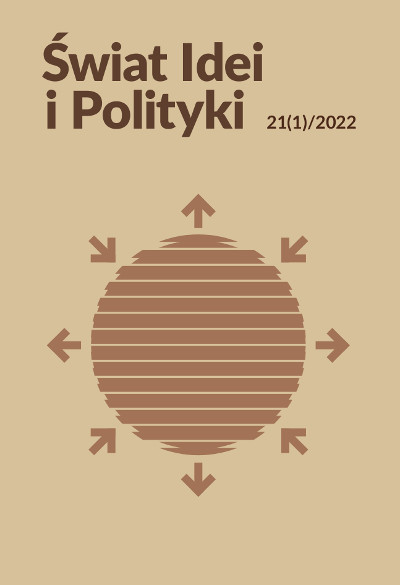Terror na torach. Studium przypadku terroryzmu południowomolukańskiego w Holandii 1975–1977
DOI:
https://doi.org/10.34767/SIIP.2022.01.09Słowa kluczowe:
terroryzm, nacjonalizm, diaspora, uprowadzenia, kolejeAbstrakt
Artykuł omawia przypadki porwań pociągów w Holandii w latach 70. XX w. na tle szerszego zjawiska terroryzmu południowomolukańskiej diaspory. Stawia sobie za cel analizę przebiegu zamachów w celu ustalenia słabych i mocnych stron transportu kolejowego w kontekście zagrożenia terrorystycznego. Dla realizacji tego celu wykorzystana zostanie metoda analizy i krytyki piśmiennictwa i źródeł tj. relacji medialnych i opracowań naukowych. Hipotezą artykułu jest to, że pociąg jest dogodną sceną pozorowanej sytuacji zakładniczej.
Bibliografia
Ad’ha Aljunied, S.M. (2011). Countering Terrorism in Maritime Southeast Asia: Soft and Hard Power Approaches. Journal of Asian and African Studies, 47(6), 652–665. DOI: 10.1177/0021909611427252.
Bartels, D. (1986). Can the Train Ever Be Stopped Again? Developments in the Moluccan Community in the Netherlands before and after the Hijackings. Indonesia, 41, 23–45.DOI: 10.2307/3351034.
Chalk, P. (2013). De Punt Train Siege. W: tegoż (red.), Encyclopedia of Terrorism. Santa Barbara–Denver–Oxford: ABC-CLIO.
Clutterbuck, R. (1992). Negotiating with terrorists. Terrorism and Political Violence, 4(4),263–287 DOI: 10.1080/09546559208427186.
Buchanan, C. (2011). Conflict Management in Indonesia – An Analysis of the Conflictsin Maluku, Papua and Poso. Geneva: Centre for Humanitarian Dialogue.
Dalstra, K. (1983). The South Moluccan Minority in the Netherlands. Contemporary Crises, 7, 195–208. DOI: 10.1007/BF00728361 .
Domarańczyk, Z. (1975). Terroryzm. Warszawa: Młodzieżowa Agencja Wydawnicza.
Drozdiak, W. (1977, 24 maja). Gunmen Seize Train. Washington Post.
Forest, J.J.F. (2007). The Modern Terrorist Threat to Aviation Security. Perspectives On Terrorism, 1(6), 10–13.
Front Siwa Lima. Pobrano z lokalizacji: https://frontsiwalima.org/ [dostęp: 31.01.2022].
de Graaf, B. (2021).Terrorism in the Netherlands. A History. W: R. English (red.), The Cambridge History of Terrorism. Cambridge: Cambridge University Press.
Haider, H. (2015). Radicalisation of diaspora communities (GSDRC Helpdesk Research Report 1187). Birmingham: GSDRC, University of Birmingham.
Herman, V. & van der Laan Bouma, R. (1980). Nationalists without a nation: South Moluccan terrorism in the Netherlands. Terrorism, 4(1–4), 223–257. DOI:10.1080/10576108008435491.
Janse, R. (2005). Fighting terrorism in the Netherlands; a historical perspective. Utrecht Law Review, 1 (1), 55–67. DOI: 10.18352/ulr.3.
Käsehage, N. (2020). Prevention of Radicalization in Western Muslim Diasporas. W: A.P. Schmid (red.), Handbook of Terrorism Prevention and Preparedness. Hague:ICCT Press.
van Liere, L.M. (2011). Fighting for Jesus on Ambon: Interpreting Religious Representations of Violent Conflict. Exchange, 40(4), 322–335. DOI: 10.1163/157254311X601851.
Manuhutu, W. (1991). Moluccans in the Netherlands: a Political Minority? W: L’émigration politique en Europe aux XIXe et XXe siècles. Actes du colloque de Rome (3–5 mars 1988). Rome: École française de Rome.
Marselis, R. (2016). Remembering Dutch-Moluccan radicalism: memory politics and historical event television. Memory Studies, 9(2), 203–217. DOI: 10.1177/1750698015596015.
Miller, J.M. (2007). Conceptualizing the Hijacking Threat to Civil Aviation. Criminal Justice Review, 32(3), 209–232. DOI: 10.1177/0734016807306152.
Nawawi, M.A. (1971). Punitive Colonialism: The Dutch and the Indonesian National Integration. Journal of Southeast Asian Studies, 2(2), 159–168.
New York Times (1977, 2 czerwca). Dutch Authorities, Moluccans Disagree on Mediators.
New York Times (1977, 12 czerwca). Dutch Psychiatrist Assesses the Terrorists.
Non-state armed groups (2006). The Military Balance, 106(1), 417–434.
Ocala Star-Banner (1977, 23 maja). Moluccan Extremists Seize School, Hijack Train.
Oostindie, G. & Steijlen, F. (2021). Ethnic ‘Ferociousness’ in Colonial Wars. Moluccans in the Dutch Army in Indonesia, 1945–1949. Journal of the Humanities & Social Sciences of Southeast Asia & Oceania / Bijdragen tot de Taal-, Land – en Volkenkunde, 177(4),491–523. DOI: 10.1163/22134379-bja10032.
Pérez, C.M. (2004). Anatomy of a Hostage Rescue: What Makes Hostage Rescue Operations Successful (Thesis). Monterey: Naval Postgraduate School.
Quandt, W.B. & Jabber, F. & Lesch, A.M. (1973). The Politics of Palestinian Nationalism. Berkeley–Los Angeles–London: University of California Press.
Rao, M. & Vidyattama, Y. (2017). The Economic Cost of Violent Conflicts: The Case of the Maluku Province in Indonesia. Bulletin of Indonesian Economic Studies, 3(3), 281–308. DOI: 10.1080/00074918.2017.1298720.
Rasser, M. (2005). The Dutch Response to Moluccan Terrorism, 1970–1978. Studies in Conflict & Terrorism, 28(6), 481–492. DOI: 10.1080/10576100591008953.
Schmid, A.P. (1993). Countering Terrorism in the Netherlands. W: A.P. Schmid & R. Crelinsten (red.), Western Responses to Terrorism. London–Portland: Routledge.
Stankiewicz, W. (2005). International Terrorism at Sea as a Menace to the Civilization of the 21st
Century. American Behavioral Scientist, 48(6). DOI: 10.1177/0002764204272573.
Steijlen, F. (2012). Closing the ‘KNIL chapter’: A key moment in identity formation of Moluccans in the Netherlands. W: U. Bosma (red.), Post-colonial immigrants and identity formations in the Netherlands. Amsterdam: Amsterdam University Press.
Time (1977, 6 czerwca). Children in a School of Terror.
Time (1977, 20 czerwca). The Commandos Strike at Dawn.
Warmenhoven, H.J. (1978). Who Are These South Moluccans. Worldview, 21(3), 8–11. DOI: 10.1017/S0084255900027200.
Weraksa, J. (1975). Etiopia przede wszystkim. Warszawa: Wydawnictwo MON.
Whitney, C.R. (1977, 16 czerwca). 20‐Day Ordeal Aboard the Hijacked Dutch Train, as Described by Those Who Survived. New York Times.
Zimmermann, D. & Rosenau, W. (red.) (2009). The Radicalization of Diasporas and Terrorism. Zürich: RAND Corporation.


